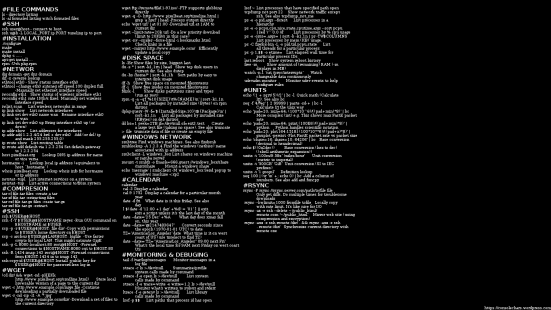Vous n'êtes pas identifié(e).
- Contributions : Récentes | Sans réponse
#1 10-09-2015 09:53:23
- WarLocG
- #! modo de compet

Fabriquer un fond d'écran memento/cheat sheet en python
Script que j'ai découvert par hasard, a tester et modifier/traduire pour en affiner la compréhension mais très intéressant. Sous python 2.7
source: https://consolechars.wordpress.com/2012 … or-python/
autheur: Jacek Zaleski

code:
#!/bin/python2.7
######################################
# Jacek Zaleski #
# CAWG #
# CHEATS WALPAPER GENERATOR #
# V0.2.2 #
######################################
import PIL
from PIL import ImageFont
from PIL import Image
from PIL import ImageDraw
import fileinput
import textwrap
import pygame
def pointstopixel(punkty):
pixel=(punkty*(96/72))
return pixel
def wieksza(a ,b):
if a>=b:
a=a
else:
a=b
return a
outputfile="tapeta.png"
VROZMIAR=56
HROZMIAR=800
KOLUMNA=55
FONTSIZE=9
FONTSIZE2=14
pygame.init()
screen_info = pygame.display.Info() #Required to set a good resolution for the game screen
HROZMIAR,VROZMIAR = screen_info.current_w,screen_info.current_h
font1 = ImageFont.truetype("/usr/share/fonts/truetype/ttf-dejavu/DejaVuSerif.ttf",FONTSIZE,encoding='unic')
font2 = ImageFont.truetype("/usr/share/fonts/truetype/ttf-dejavu/DejaVuSans-Bold.ttf",FONTSIZE2,encoding='unic')
img=Image.new("RGBA", (HROZMIAR,VROZMIAR),(0,0,0))
draw = ImageDraw.Draw(img)
#y_text=15
w=10
y_text = 45
width = 5
widthtt=0
maxw=0
height=0
f = open('dane.txt','r')
for text in iter(f):
h=0
lines = textwrap.wrap(text, KOLUMNA)
if width < HROZMIAR:
if pointstopixel(y_text+25)>VROZMIAR:
width += pointstopixel(maxw)+10
y_text=45
if text[0]=='#':
font=font2
else:
font=font1
semf=0
for line in lines:
if semf>0:
line=" "+line
widthtt, height = font.getsize(line)
maxw=wieksza(maxw,widthtt)
semf +=1
draw.text((width, y_text), line, font = font, fill = (255,255,255))
y_text += height
else:
break
print 'niediala'
f.close()
stopka="https://consolechars.wordpress.com"
width7, height7 = font.getsize(stopka)
draw.text((HROZMIAR-width7,VROZMIAR-height7),stopka , font = font1, fill = (255,255,255))
draw = ImageDraw.Draw(img)
pygame.display.set_mode
#print pygame.display.Info
img.save(outputfile)
img.show()avec fichier txt en exemple pour créer le memento/cheat sheet:
#FILE COMMANDS
ls - directory listing
ls -al formated listing witch formated files
#SSH
ssh user@host - connect to host
ssh u@h -L LOCAL_PORT:ip:PORT tuneling ip to port
#INSTALLATION
./configure
make
make install
dpkg -i .....
apt-get install ...
rpm -Uvh pkg.rpm
#NETWOR
dig domain -get dns domain
dif -x -reverse lookup
ethtool eth0 - Show status interface eth0
ethtool --change eth0 autoneg off speed 100 duplex full -Manually set ethernet interface speed
iwconfig eth1 Show status of wireless interface eth1
iwconfig eth1 rate 1Mb/s fixed Manually set wireless interface speed
iwlist scan List wireless networks in range
ip link show List network interfaces
ip link set dev eth0 name wan Rename interface eth0 to wan
ip link set dev eth0 up Bring interface eth0 up (or down)
ip addr show List addresses for interfaces
ip addr add 1.2.3.4/24 brd + dev eth0 Add (or del) ip and mask 255.255.255.0)
ip route show List routing table
ip route add default via 1.2.3.254 Set default gateway to 1.2.3.254
host pixelbeat.org Lookup DNS ip address for name or vice versa
hostname -i Lookup local ip address (equivalent to host `hostname`)
whois pixelbeat.org Lookup whois info for hostname or ip address
netstat -tupl List internet services on a system
netstat -tup List active connections to/from system
#COMPRESION
tar cf file.tar files -create a tar
tar xf file.tar -extracting files
tar czf file.tar.gz files -ceate tar.gz
tar xzf file.tar.gz -extract
#SSH
ssh $USER@$HOST
ssh -f -Y $USER@$HOSTNAME xeyes -Run GUI command on $HOSTNAME as $USER
scp -p -r $USER@$HOST: file dir/ -Copy with permissions to $USER's home directory on $HOST
scp -c arcfour $USER@$LANHOST: bigfile -Use faster crypto for local LAN. This might saturate GigE
ssh -g -L 8080:localhost:80 root@$HOST -Forward connections to $HOSTNAME:8080 out to $HOST:80
ssh -R 1434:imap:143 root@$HOST -Forward connections from $HOST:1434 in to imap:143
ssh-copy-id $USER@$HOST Install -public key for $USER@$HOST for password-less log in
#WGET
(cd dir/ && wget -nd -pHEKk http://www.pixelbeat.org/cmdline.html) Store local browsable version of a page to the current dir
wget -c http://www.example.com/large.file -Continue downloading a partially downloaded file
wget -r -nd -np -l1 -A '*.jpg' http://www.example.com/dir/ -Download a set of files to the current directory
wget ftp://remote/file[1-9].iso/ -FTP supports globbing directly
wget -q -O- http://www.pixelbeat.org/timeline.html | grep 'a href' | head -Process output directly
echo 'wget url' | at 01:00 -Download url at 1AM to current dir
wget --limit-rate=20k url -Do a low priority download (limit to 20KB/s in this case)
wget -nv --spider --force-html -i bookmarks.html Check links in a file
wget --mirror http://www.example.com/ Efficiently update a local copy
#DISK SPACE
ls -lSr Show files by size, biggest last
du -s * | sort -k1,1rn | head Show top disk users in current dir. See also dutop
du -hs /home/* | sort -k1,1h Sort paths by easy to interpret disk usage
df -h Show free space on mounted filesystems
df -i Show free inodes on mounted filesystems
fdisk -l Show disks partitions sizes and types (run as root)
rpm -q -a --qf '%10{SIZE}\t%{NAME}\n' | sort -k1,1n List all packages by installed size (Bytes) on rpm distros
dpkg-query -W -f='${Installed-Size;10}\t${Package}\n' | sort -k1,1n List all packages by installed size (KBytes) on deb distros
dd bs=1 seek=2TB if=/dev/null of=ext3.test Create a large test file (taking no space). See also truncate
> file truncate data of file or create an empty file
#WINDOWS NETWORK
smbtree Find windows machines. See also findsmb
nmblookup -A 1.2.3.4 Find the windows (netbios) name associated with ip address
smbclient -L windows_box List shares on windows machine or samba server
mount -t smbfs -o fmask=666,guest //windows_box/share /mnt/share Mount a windows share
echo 'message' | smbclient -M windows_box Send popup to windows machine /dev/null Summarise/profile system calls made by command
strace -f -e open ls >/dev/null List system calls made by command
strace -f -e trace=write -e write=1,2 ls >/dev/null Monitor what's written to stdout and stderr
ltrace -f -e getenv ls >/dev/null List library calls made by command
lsof -p $$ List paths that process id has open
lsof ~ List processes that have specified path open
tcpdump not port 22 Show network traffic except ssh. See also tcpdump_not_me
ps -e -o pid,args --forest List processes in a hierarchy
ps -e -o pcpu,cpu,nice,state,cputime,args --sort pcpu | sed '/^ 0.0 /d' List processes by % cpu usage
ps -e -orss=,args= | sort -b -k1,1n | pr -TW$COLUMNS List processes by mem (KB) usage.
ps -C firefox-bin -L -o pid,tid,pcpu,state List all threads for a particular process
ps -p 1,$$ -o etime= List elapsed wall time for particular process IDs
last reboot Show system reboot history
free -m Show amount of (remaining) RAM (-m displays in MB)
watch -n.1 'cat /proc/interrupts' Watch changeable data continuously
udevadm monitor Monitor udev events to help configure rules
#UNITS
echo '(1 + sqrt(5))/2' | bc -l Quick math (Calculate φ). See also bc
seq -f '4/%g' 1 2 99999 | paste -sd-+ | bc -l Calculate π the unix way
echo 'pad=20; min=64; (100*10^6)/((pad+min)*8)' | bc More complex (int) e.g. This shows max FastE packet rate
echo 'pad=20; min=64; print (100E6)/((pad+min)*8)' | python Python handles scientific notation
echo 'pad=20; plot [64:1518] (100*10**6)/((pad+x)*8)' | gnuplot -persist -Plot FastE packet rate vs packet size
echo 'obase=16; ibase=10; 64206' | bc Base conversion (decimal to hexadecimal)
echo $((0x2dec)) Base conversion (hex to dec) ((shell arithmetic expansion))
units -t '100m/9.58s' 'miles/hour' Unit conversion (metric to imperial)
units -t '500GB' 'GiB' Unit conversion (SI to IEC prefixes)
units -t '1 googol' Definition lookup
seq 100 | (tr '\n' +; echo 0) | bc -Add a column of numbers. See also add and funcpy
#RSYNC
rsync -P rsync://rsync.server.com/path/to/file file Only get diffs. Do multiple times for troublesome downloads
rsync --bwlimit=1000 fromfile tofile Locally copy with rate limit. It's like nice for I/O
rsync -az -e ssh --delete ~/public_html/ remote.com:'~/public_html' Mirror web site (using compression and encryption)
rsync -auz -e ssh remote:/dir/ . && rsync -auz -e ssh . remote:/dir/ Synchronize current directory with remote oneHors ligne
#2 10-09-2015 12:47:20
- IceF0x
- #! Gourou Linux

Re : Fabriquer un fond d'écran memento/cheat sheet en python
Merci, je testerai ça dès que possible 
Utiliser des logiciels propriétaires, c'est comme les plats préparés, on est incapable de dire les conservateurs qu'ils contiennent, on dira toujours que c'est bon, mais ça ne remplacera jamais le repas fait maison par sa maman.
]:D #! Crunchbang & Archlinux GNU/Linux User ]:D
Hors ligne
#3 22-10-2015 14:37:10
- azgarech
- Crazy one

Re : Fabriquer un fond d'écran memento/cheat sheet en python
Pour la traduction, c'est du polonais.
Security is always excessive until it’s not enough. — Robbie Sinclair
Hors ligne
#4 24-10-2015 10:57:26
- Edward Cryptickiller
- Membre

Re : Fabriquer un fond d'écran memento/cheat sheet en python
Super! Merci!
Mon wiki: https://github.com/edcryptickiller/wiki/wiki
QTox ID: DC13B169A1EB023449E5AB6D3314F3B5EF04E03B1D3F0B0AF7500B94A2AC8114C5E03B44D45E
Public PGP key: http://pastebin.com/NpZkwK2n
Email: edcryptickiller@tutanota.com
Hors ligne
